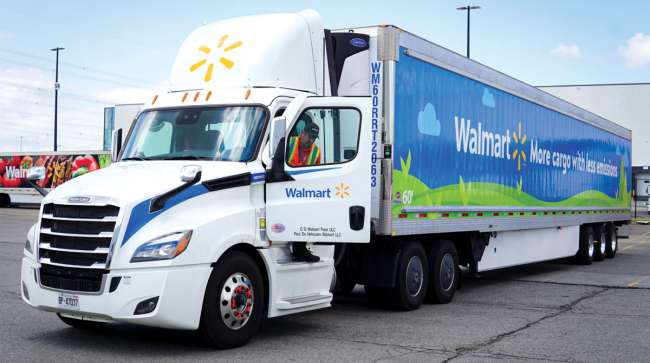Staff Reporter
Private Fleets Ship Record 75% of Owners’ Outbound Freight

[Stay on top of transportation news: Get TTNews in your inbox.]
Private fleets transported a record 75% of the outbound freight the companies that own them shipped in 2023, according to a recent study released by the National Private Truck Council.
The share of shipments rose 5 percentage points from a then-record 70% slice of the pie a year earlier and is part of an increased focus on costs, respondents to the annual survey said.
Prior to the past two years, the in-house market share had remained steady at the 67% level throughout the survey’s history, NPTC said.
Two periods over the past decade when it was difficult to source capacity for cargoes have led to this point, Gary Petty, CEO of NPTC, told Transport Topics in August: the 2017-18 freight boom and the COVID-19 pandemic.
For-hire motor carriers handled 16% of all outbound freight movements in 2023, according to the survey, compared with 17% over each of the previous four years. Dedicated contract carriers won an 8% share, down 3 percentage points year over year.
RELATED: Where the 2024 Top 100 Private Carriers Are Based in North America
Some 84% of all private fleet outbound volume goes directly to the retail customer, according to respondents, the highest percentage recorded in the history of the survey, which was first conducted in 2005.

A record 122 fleets took part in the survey. Some 28% of participants were first-time contributors, the highest level on record, and up from 20% a year earlier. The survey was sponsored by Penske Truck Leasing.
The largest segment of respondents came from the food products sector (17%), followed by retail products (16%) and grocery stores (14%).
RELATED: Private Carrier Sector Rankings Reflect Fleet Growth
Participants in this year’s survey reported that shipments increased 7.5% year over year, compared with 4.6% growth a year earlier. Likewise, volume rose 8.6% year over year, compared with the previous year’s 8.4% growth and 7.3% in 2021, the survey results showed.
The value of private fleet freight movements increased 7.2% year over year, easily surpassing a 2.8% rise a year earlier.
Those numbers came despite 72% of respondents indicating that capacity was more easily available in 2023 and more affordable.
In the wake of the pandemic in particular, private fleets expanded to gain better control of their supply chain, while hedging against the fluctuations in service and for-hire carrier market prices, even as for-hire supply slackened and rates fell.
Transtex CEO Mathieu Boivin discusses the environmental sustainability of auxiliary power units. Tune in above or by going to RoadSigns.ttnews.com.
The top three reasons for maintaining a private fleet were improved customer service (49%), controlling transportation costs (20%) and enhancing control over supply chain (13%), companies said.
When the percentages for respondents’ top five reasons are combined, however, hedging against outside carrier capacity and/or costs enters the top three.
Cost metrics’ importance to fleets is on the rise.
Some 55% of the respondents reported benchmarking their private fleet performance against for-hire carriers based on service and/or rates in the most recent survey, compared with 45% a year earlier and 52% the previous year.
Cost per mile was the key metric for fleet owners in monitoring and improving customer service, with 90% of carriers following that factor, 72% tracking on-time figures and 62% delivery accuracy.
It was the first time since the survey launched that on-time performance failed to attain the top spot. Cost per mile over the history of the survey has been a primary factor just 35% of the time.
Want more news? Listen to today's daily briefing above or go here for more info
Meanwhile, the importance of cost per stop and cost per case rose to 30% and 46%, respectively, in the most recent year from 18% and 17%.
The Transport Topics Top 100 Private Carriers list lays bare the increased focus on cost at the sharp end of retailing, with a discount store chain entering the top 20 after being unranked 12 months earlier.
Dollar General, which landed at No. 18, said it expanded its private fleet to more than 2,000 tractors by the end of 2023 to optimize costs and gain more control over its supply chain.
The rankings are based on responses to an annual fleet survey, correspondence with company management and public carrier registration data filed with the Federal Motor Carrier Safety Administration.
Walmart’s initiatives to strengthen its in-house fleet, meanwhile, elevated it to No. 1 on the Top 100. The retail giant expanded its fleet to 12,663 power units, a year-over-year increase of about 1,300 tractors. Walmart took the top spot from PepsiCo Inc., which had led the rankings for 14 consecutive years.
Bentonville, Ark.-based Walmart last held the No. 1 ranking in 2002, when TT published its first Top 100 Private Carriers list. In 2003, Walmart dropped to No. 3 after selling distribution subsidiary McLane Co. to Berkshire Hathaway.
More than half the 2024 Top 100 private carriers increased the size of their tractor fleets during the past year.
At the same time, private fleet owners reported that their greatest challenge was a range of driver-related issues: an aging workforce, difficulties in recruiting and hiring, high turnover rates, poor retention and overall shortages.





